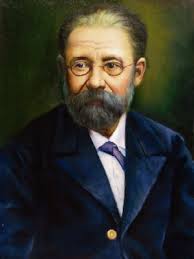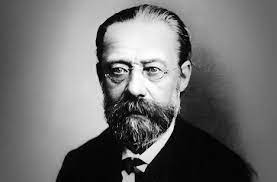Bedřich Smetana, often hailed as the father of Czech national music, was a composer whose works are deeply intertwined with the cultural and historical fabric of his homeland. Known for his symphonic poem cycle Má vlast and the opera The Bartered Bride, Smetana’s compositions resonate with national pride and personal expression. Here are five fascinating curiosities about this influential composer:
1. The Pioneer of Czech National Music
While many European composers embraced their national identities, Smetana was among the first to infuse his compositions with distinctly Czech themes. His music, particularly Má vlast (My Homeland), celebrates the landscapes, legends, and spirit of the Czech people. This work remains a cornerstone of Czech cultural identity, with the movement Vltava (also known as The Moldau) being especially beloved for its vivid depiction of the Vltava River.
2. Composed Masterpieces Despite Total Deafness
A lesser-known but remarkable fact about Smetana is that he composed some of his most significant works after becoming completely deaf in 1874. Similar to Beethoven, Smetana did not let his hearing loss hinder his creativity. In fact, his deafness coincided with the creation of Má vlast, a testament to his resilience and unwavering dedication to his art.
3. A Musical Prodigy From a Young Age
Smetana showed extraordinary musical talent early in life. He performed publicly on the piano by the age of six and composed his first piece at eight. Despite his evident talent, he faced challenges in receiving formal music education due to his father’s initial disapproval of a musical career. However, his passion prevailed, and he eventually studied under the esteemed pianist Josef Proksch in Prague.
4. Personal Tragedies Reflected in His Music
Smetana’s life was marked by profound personal losses, including the deaths of his three daughters and his first wife. These tragedies deeply influenced his music, imbuing it with emotional depth and poignancy. His String Quartet No. 1 in E minor, known as From My Life, is a deeply personal work that reflects his joys, sorrows, and the struggle with his deafness.
5. A Visionary for Czech Opera
Smetana revolutionized Czech opera by establishing it as a respected art form with his groundbreaking works like The Bartered Bride and Libuše. Unlike the prevailing Italian and German operatic styles, Smetana’s operas were rooted in Czech folklore, language, and national identity. His efforts laid the groundwork for future Czech composers, including Antonín Dvořák and Leoš Janáček.
Bedřich Smetana’s legacy endures not only through his compositions but also in the heart of Czech culture. His music continues to inspire and evoke a sense of national pride, making him a true icon of classical music history.


Comments are closed